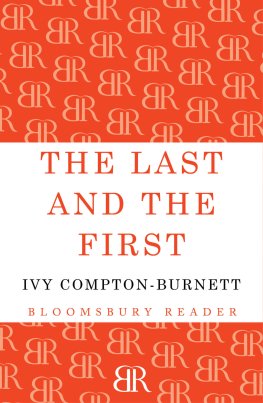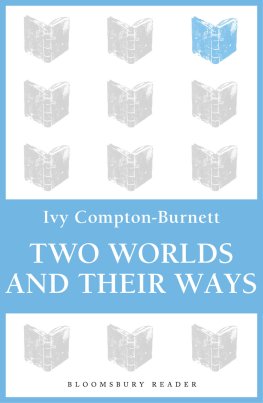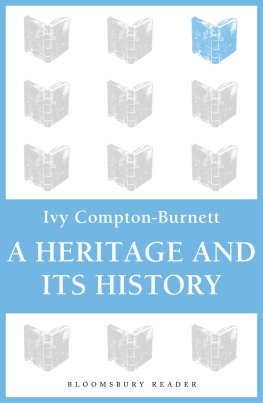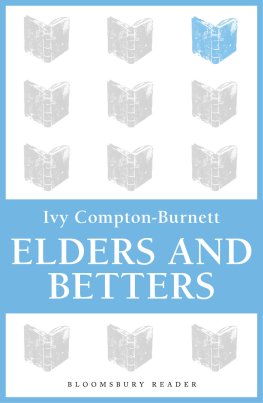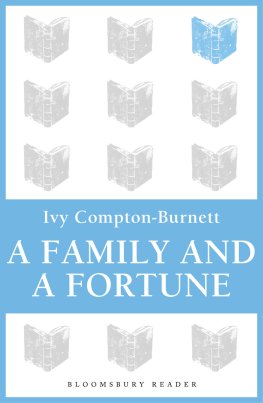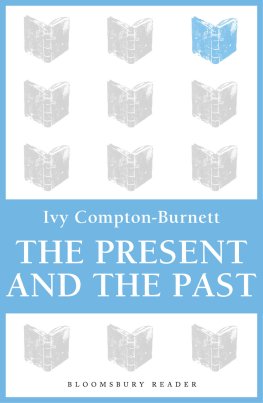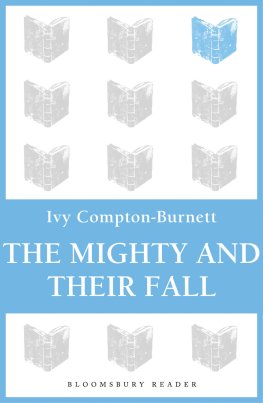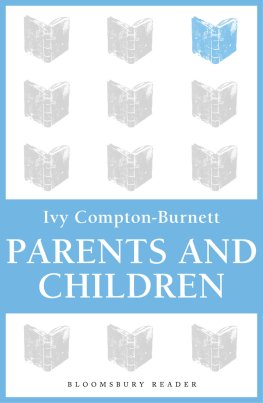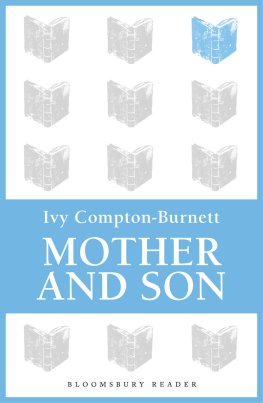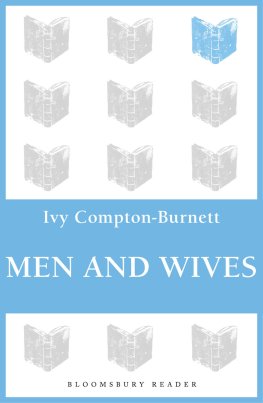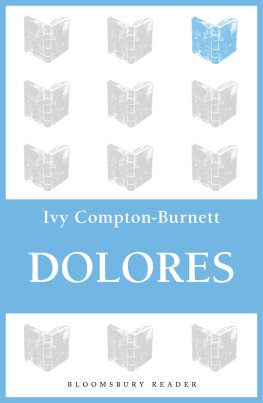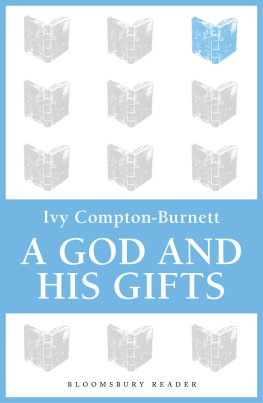Ivy Compton-Burnett
The Last and the First
What an unbecoming light this is! said Eliza Heriot, looking from the globe above the table to the faces round it.
Are we expected to agree? said her son, as the light fell on her own face. Or is it a moment for silence?
The effect is worse with every day. I hardly dare look at any of you.
You have found the courage, said her daughter, and it is fair that you should show it. You appointed the breakfast hour yourself.
Lady Heriot did not suggest that anyone else should appoint it.
Well, good morning to you all, she said, her plural phrase suggesting she did not greet rare creatures. So you are all in time to-day.
As we are on most days, said her son. You imply a thing that is not.
Good-morning, Mater, said the younger of her step-daughters, her quiet tone challenging any cause for criticism. Yes, we are all in time, and happy in the firelight until the daylight intervenes.
The fire must have been lighted early to be as forward as this, said Eliza, with her eyes on it. I must go into the matter later.
The fire in this grate is never slow, said her elder step-daughter. It was cold and black when I saw it half-an-hour ago.
I will go into the matter later, said Eliza, as though untouched by the words.
It takes time for a fire to grow. If it fails in that purpose it is lost in another way. It is another kind of waste.
I will go into the matter later, said her step-mother. Hermia, do you eat no fat at all?
None, as you know. I am not a stranger to you.
Well, you almost are, said Eliza with a sigh. I hardly understand this intensity of feeling over food. It is not such a great matter.
I might say the same to you. Though we are talking of fat not food.
Well-behaved people betray no feeling about such things.
Likes and dislikes go a little deeper than that, Mater, said Madeline.
Nothing goes deeper than manners, said Eliza, in an instructive tone. They are involved with the whole of life. It is they that give rise to it, and come to depend on it. We should all remember it.
It might be well to forget it, said her son, if it in any way suggests the whole of life. Our own share of that is enough, and we know you are equal to the rest.
Eliza almost laughed at the compliment in the words, and turned her eyes in maternal feeling on her own children, her expression revealing that it was strong and deep. She was a fair, almost handsome woman of fifty-five, with solid aquiline features and a short, upright frame, and active hands that seemed their natural complement.
Her daughter and second child was like and unlike her, with another strain showing in her lighter form and face, and something both weaker and stronger in the impression she made.
The only son, Angus, was as short for a man as his mother for a woman, broad and heavy and almost plain, with a likeness to his father that gave him his family place. They both had more expressive eyes than Eliza, grey in Roberta and hazel in Angus; and Roberta had also what were known as the Heriot hands, while Anguss recalled Sir Roberts. Though now between the ages of twenty and twenty-four, they were conscious of Eliza and under constraint in her presence.
Hermia, her elder step-daughter, bore the strongest likeness to the father, which was noted by strangers and ignored by Eliza, who passed over family resemblances, was indeed hardly alive to them. Hermia was a tall, dark, restless woman of thirty-four, with a look of being personally unusual, inherited from her father and recognised by herself. She looked her full age and saw nothing against it, indeed had this attitude to most of what she was and did, but failed to share it with Eliza who simply saw no ground for it.
Madeline, four years younger, was taller and fairer and more ordinary, with pale eyes, a compressed nose and mouth, long, rather lifeless hands and limbs and her own self-esteem, which Eliza was inclined to accept, indeed almost saw as justified.
The power in the family was vested in Eliza, as her husband left it wholly in her hands, and had moreover willed the property to her, in trust at her death, but subject to her control during her life. She wielded the power as she thought and meant, wisely and well, but had not escaped its influence. Autocratic by nature, she had become impossibly so, and had come to find criticism a duty, and even an outlet for energy that had no other.
Hermia resented her power and her use of it, and failed to grasp her fathers feeling for her; and Madeline cultivated an affection for her, feeling it in some way a tribute to herself. That their father would hardly have made the will if he had fully known her was believed by Hermia and suspected by her children, though it had not occurred to herself.
Sir Robert Heriot entered the room, an impressive old man, looking less than his eighty-two years, and otherwise much as the father of Angus and Hermia would be expected to look. He took the seat at his wifes side, renouncing the end of the table, and leaving other places empty, as she would assign them to no one else. Roberta had the seat on his other hand, by virtue of being his chosen child. The position was accorded her by her mother, and could not be questioned, as the date was that of her birth.
Hermia, said Eliza, I gave you money to pay the tradespeople, on your errand to the village yesterday.
They were paid, said Hermia.
I have a sense of grievance, said Eliza, in a light tone. Something must be owing to me.
Often an untrue belief, Mater, said Hermia. This time it is not. I left your change in the library.
Eliza signed to her son, who left the room. There was a pause.
And I took it to pay a parish subscription, said Madeline. Angus is perplexed and taking time to find it.
Her brother returned and laid some coins at his mothers hand.
Why, where did you get it, my boy?
Oh Hermia said the library.
It was not there. It had been taken and used.
Oh well, I thought you wanted it.
Not those particular coins. Just some change for my purse. Why did you not say it was not there?
Oh, I thought perhaps it ought to be.
What an empty episode! said Eliza. It seems to have no meaning.
It has none, said Sir Robert. So we will not give it one. We will not pretend that something has happened when nothing has. Another time deal openly, my son.
As things are, Angus is paying the subscription, said Madeline.
I will pay it as a penalty. I took too much on myself. It is all a storm in a teacup.
If it stays there, said Roberta. I never think teacups can be equal to the tempests they contain.
Eliza used another tone. Did you have a fire in your room last night, Hermia? I saw the ashes in the grate as I passed the door.
Then you know I had one. And you must have opened the door. I shut it when I came down.
I open any door in my house when and where I please. That is not what I said. I asked if you had a fire in your room, and I am waiting for an answer.
There is no need of one. You have seen that I did. It was too cold to be without one.
Did you ask me if you could have a fire? You know my rule.
The words would have had no meaning.
You gave an order to servants of mine in my house, and said no word on the matter. What can be said to that?
There was a pause, and Sir Robert looked down with a disturbed expression. He was normally on the side of his wife, hardly believing that she could be wrong, and caring especially for her children; but he kept the feelings of a father and the memory of the days when Hermia stood high in his life.
This house is my home, said his daughter. I remain in it as I have no other. I am entitled to human comfort under its roof.

